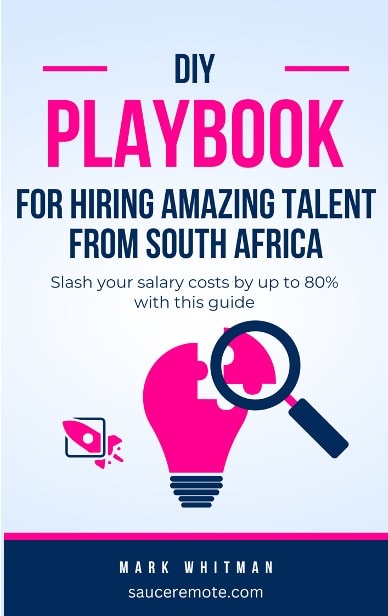Considering adding Nigerian talent to your team? Smart move!
Nigeria's vibrant economy and growing workforce make it a prime destination for global businesses.
But how do you tackle the complexities of Nigerian employment laws and cultural nuances?
Enter the Employer of Record (EOR) in Nigeria.
Let's explore how partnering with an EOR in Nigeria can be your strategic advantage for a smooth and compliant expansion.
Ready? Let's roll.

Discover how to slash your salary costs by 80%
Get our exact process for hiring amazing overseas talent from South Africa. Includes copy-and-paste templates and a detailed salary guide.
What Is an Employer of Record in Nigeria?
An Employer of Record in Nigeria is a third-party organisation that officially employs workers on your behalf and manages all local legal, HR, and payroll responsibilities.
In short? The EOR becomes the legal employer, handling compliance and administration while you direct your team's day-to-day activities.
My pro tip: New to this concept? Check out my guide on What Does EOR Stand For to learn more.
So, why do so many companies choose to work with an EOR in Nigeria?
Here's why:
- Streamlined Market Entry: Skip the lengthy process of establishing a legal entity in Nigeria.
- Regulatory Compliance: Navigate Nigeria's complex labour laws with expert guidance.
- Cost Efficiency: Reduce overhead and administrative burdens associated with setting up locally.
In short, EOR services allow you to tap into Nigeria's market quickly and compliantly without the usual hassles.
But what makes Nigeria's labour market unique, and how can an EOR help you succeed?
Let's unpack that.
Hire remote talent from South Africa & slash salary costs by 80%
Salaries start from £8,000 per year!
Understanding The Nigerian Employment Landscape
When I first looked into hiring in Nigeria, I was struck by the country's dynamic labour market and diverse workforce.
While opportunities abound, navigating the local labour laws can present challenges for foreign businesses unfamiliar with the regulations.
Here's what you need to know:
Working Hours and Overtime
In Nigeria, the standard workweek is typically 40 hours, usually 8 hours per day, Monday through Friday.
However, overtime in Nigeria isn't regulated like in most other countries:
- Overtime Limits: There are no specific statutory limits on overtime hours, but employers must ensure that working hours are reasonable and do not negatively impact employee health.
- Overtime Pay Rates: Generally, overtime is paid at 150% of the regular hourly rate. For work on weekends and public holidays, the rate can be 200%.
Refer to the Nigerian Labour Act for detailed guidelines.
Compensation and Currency
The local currency is the Nigerian Naira (NGN).
Nigeria has a national minimum wage, which, as of 2024, is set at NGN 70,000 per month, a 12.9% increase from the previous minimum wage rate.
Common Compensation Practices:
- Bonuses: Not mandated by law but are common in the form of performance bonuses.
- Allowances: Including transportation, housing, and meal allowances are customary.
Next, let’s look at public holidays and annual leave in Nigeria.
Hire remote talent from South Africa & slash salary costs by 80%
Salaries start from £8,000 per year!
Public Holidays and Annual Leave
Nigeria observes several national public holidays, which vary each year but typically include:
- New Year's Day
- Good Friday
- Easter Monday
- Worker's Day
- Democracy Day
- Independence Day
- Christmas Day
- Boxing Day
- Eid al-Fitr (End of Ramadan)
- Eid al-Adha (Feast of Sacrifice)
Annual Leave Entitlement:
After one year of continuous service, employees are entitled to a minimum of six working days of paid annual leave. For employees under the age of 16, leave entitlement is at least 12 working days.
Tax Obligations and Contributions
Navigating taxes in Nigeria involves understanding several key components:
Income Tax
Employers must withhold Pay-As-You-Earn (PAYE) taxes from employees' salaries, with progressive rates ranging from 7% to 24%.
Social Insurance Contributions
Both employers and employees contribute to Nigeria's social security schemes:
- Pension Scheme: Employers must contribute a minimum of 10% of the employee's monthly salary, and employees, in turn, must contribute a minimum of 8% deducted from their salary.
- Employee Compensation Act: Employers contribute 1% of the total monthly payroll to cover work-related accidents and injuries.
For precise figures, consult the National Pension Commission and the Nigeria Social Insurance Trust Fund.
So what about leave policies and parental leave in Nigeria? Let’s find out.
Hire remote talent from South Africa & slash salary costs by 80%
Salaries start from £8,000 per year!
Leave Policies and Parental Leave
Here's what Nigerian employees and employers can expect:
Sick Leave
- Employees are entitled to up to 12 days of paid sick leave per year.
- A medical certificate may be required after a certain number of days.
Maternity and Paternity Leave
- Maternity Leave: Female employees are entitled to 12 weeks of maternity leave at 50% of their regular pay. Some employers may offer full pay as part of their policies.
- Paternity Leave: Not mandated by federal law, but some states like Lagos have introduced paternity leave policies.
Probation and Termination Periods
Nigeria also has several laws regarding probation and termination periods.
Probation Period
- Commonly ranges from 3 to 6 months.
- During probation, employees have the same rights as regular employees.
Notice Period for Termination
Varies based on the length of service:
- One day's notice if the length of service is less than three months.
- One week's notice if the length of service is three months to two years.
- Two weeks' notice if the length of service is two to five years.
- One month's notice if the length of service is five years or more.
Payment in lieu of notice is acceptable.
Nigeria's labour laws require that termination be fair and justifiable. Legal advice is often necessary to ensure compliance.
Understanding these regulations is crucial to hiring successfully in Nigeria. Managing all these details can be overwhelming.
That's where an Employer of Record in Nigeria comes into play. They simplify the process and ensure you remain compliant every step of the way.
Hire remote talent from South Africa & slash salary costs by 80%
Salaries start from £8,000 per year!
How to Choose the Right EOR in Nigeria
Selecting the ideal Employer of Record in Nigeria is pivotal for hiring top talent in Nigeria.
Here's what to consider:
1. In-Depth Knowledge of Nigerian Labour Laws
Your EOR should have an expert understanding of the following:
- Employment Contracts: Navigating permanent vs. fixed-term contracts.
- Labour Regulations: Ensuring compliance with the Labour Act and other relevant laws.
- Cultural Practices: Advising on customary workplace norms and etiquette.
2. Comprehensive Service Suite
Look for an EOR that offers:
- Payroll Management
- Tax and Social Contribution Compliance
- HR Support and Employee Relations
- Legal Assistance
A full-service provider can handle all administrative tasks, freeing you to focus on your core business.
3. Transparent and Fair Pricing
Avoid unexpected costs by:
- Requesting a detailed fee structure.
- Understanding what services are included and what may incur additional charges.
4. Customised Solutions
An EOR should tailor their services to:
- Your Industry: Addressing sector-specific regulations.
- Company Size: Scaling services to match your growth.
- Unique Needs: Offering flexibility in policies and procedures.
5. Proven Track Record
Research potential EORs by:
- Reading client testimonials.
- Requesting case studies.
- Verifying their experience in Nigeria.
6. Local Presence with Global Standards
An EOR in Nigeria with a strong local team can offer:
- Cultural Insights: Enhancing communication and workplace harmony.
- Quick Response Times: Addressing issues promptly.
But if finding an EOR in Nigeria sounds tricky, there’s another solution.
Hire remote talent from South Africa & slash salary costs by 80%
Salaries start from £8,000 per year!
Exploring Alternative Labour Markets
While Nigeria presents vast opportunities, consider other markets that might suit your business goals.
For example, South Africa offers a growing economy and a tech-savvy workforce.
If hiring South African employees interests you, partnering with an experienced Employer of Record in South Africa can help.
Final Thoughts
And there you have it: Hiring Nigerian employees doesn't have to be daunting.
By partnering with a knowledgeable Employer of Record in Nigeria, you can confidently navigate the complexities of local employment laws and cultural nuances.
Focus on what you do best—growing your business—while your EOR handles the rest.
